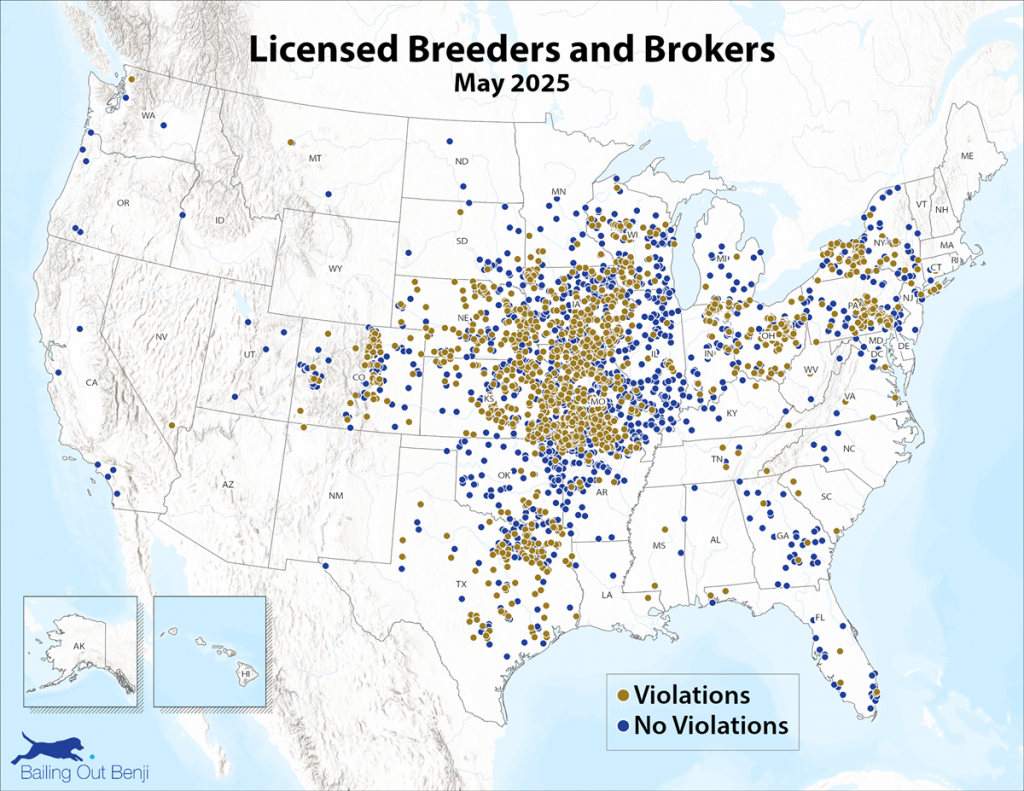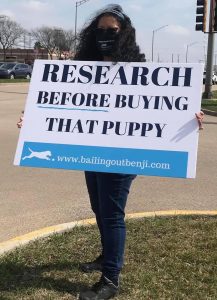Bailing Out Benji 2025

While most of the licensed, commercial dog breeders are located in the Midwest, a large majority of unlicensed breeders and even puppy mills are located in every state across the country. Breeders that sell their animals sight unseen are licensed and inspected by the USDA, but facilities on the local level are governed by a patchwork of state laws that vary widely in their licensing, inspections and enforcement. Some states have gone above and beyond to implement comprehensive regulations to ensure humane treatment and proper care, while others have minimal oversight, leaving many animals vulnerable to neglect and abuse.
As a nonprofit dedicated to improving the welfare of animals, we believe it’s crucial for the public to understand the legal landscape in order to advocate effectively for stronger protections. In this article we wanted to provide a very brief overview of the most common types of commercial breeder and pet store laws and which states participate. This is not meant to be a comprehensive list, but a point of reference for consumers who want to know more about their state.
*Please note* Cities and counties might have stronger laws surrounding these issues. This article is an overview of state laws and is not meant to be legal advice.

Consumer Protection Laws
“Pet Financing Protection laws” are regulations designed to protect consumers who finance the purchase of a pet, often through a pet store or a breeder. These laws aim to prevent predatory lending practices and ensure that consumers are fully informed about the terms and conditions of their financing agreements. Some stores and financing companies offer predatory interest rates that go as high as 188%.
States that have Pet Financing laws: California, Connecticut, Illinois, Indiana, Nevada, New Jersey, New York, Washington
“Puppy Lemon laws” prevent pet dealers from selling a consumer a pet that suffers from an illness, deadly disease, or congenital defects that could adversely affect the pet’s health, and from providing a clear notice to the consumer at the point of the sale. Each state has different criteria for consumer protections.
States that have Puppy Lemon laws: Arizona, Arkansas, California, Connecticut, Delaware, Florida, Illinois, Maine, Maryland, Massachusetts, Minnesota, Nebraska, Nevada, New Hampshire, New Jersey, New York, Oregon, Pennsylvania, Rhode Island, South Carolina, Vermont, Virginia.
Pet Store Laws
A “Retail Sales Ban” or “Pet Store Ordinance” is a law that prohibits pet stores from selling puppies sourced from large-scale, commercial breeding operations, often known for inhumane conditions. These bans aim to curb the demand for puppy mill puppies and encourage the adoption of pets from shelters and reputable breeders.
States that have prohibited the retail sale of puppies and kittens in pet stores: California (2017), Maryland (2018), Maine* (2019), Washington* (2021), Illinois (2021), New York** (2022), Oregon* (2023), Vermont (2024)
*Grandfathers in the current stores
**Doesn’t go into effect until Dec. 2024
A “Pet Store Preemption law” is legislation that prevents local governments from enacting their own regulations on the sale of pets, overriding local ordinances with state-level rules. These laws typically benefit pet stores by standardizing regulations across a state, potentially allowing the sale of animals from large-scale breeders, including puppy mills.
States that determined that localities cannot pass ordinances pertaining to the retail sale of puppies and kittens: Arizona (2016), Ohio (2016), Iowa* (2017), Texas* (2023), Arkansas (2023), Indiana (2024).
*Not a pet store specific law
Over half of the states require pet stores to be licensed or registered in some fashion. This ensures that pet stores meet certain standards of care and operation, helping to protect animal welfare and consumer interests. Not all of those states, however, perform regular inspections on those stores.
States that require pet stores to be licensed and regularly inspected: Kansas, Illinois, Iowa, Nebraska, New York, Ohio, Pennsylvania, Wisconsin
“Pet Store Sourcing laws” regulate where pet stores can obtain their animals, often prohibiting them from sourcing pets from inhumane breeding facilities, such as puppy mills. These laws typically require pet stores to source animals from licensed breeders, animal shelters, or rescue organizations to ensure better animal welfare standards. Bailing Out Benji is known for our pet store sourcing research. If you would like to know more about the stores in your state, click here.
States that have sourcing laws that pet stores must follow: Arizona, Connecticut, Indiana, Washington
Some states have enacted “Pet Store Disclosure laws” requiring pet stores to provide customers with detailed information about the breeders from whom they source their animals. These laws often mandate that pet stores disclose the breeder’s name, address, and licensing information to ensure transparency and allow consumers to make informed decisions. By implementing these laws, states aim to promote accountability and discourage sourcing from unethical breeders.
States that require pet stores to disclose their breeders on their kennels and/or website: Arizona, Colorado, Connecticut, Washington

Breeder Laws
Dog breeding laws in the United States vary widely by state, reflecting different approaches to regulating the industry and protecting animal welfare. Some states have stringent regulations, requiring breeders to be licensed, undergo regular inspections, and adhere to specific standards for the care and housing of animals. These states often impose limits on the number of breeding animals a facility can have and mandate detailed record-keeping. Other states may have more lenient or minimal regulations, with less oversight and fewer requirements for breeders. Additionally, some states have specific laws addressing commercial breeding operations, commonly known as puppy mills, to curb unethical practices and improve conditions for breeding dogs. The diversity in state laws creates a patchwork of regulations that can significantly impact the quality of life for breeding animals and the integrity of the breeding industry. Our team releases a report every quarter that details the violations occurring within USDA breeding facilities. Click here to view that information.
States that require breeders to be licensed and regularly inspected: Colorado, Illinois, Iowa, Kansas, Michigan, Minnesota, Missouri, Nebraska, New York, Ohio, Oklahoma, Pennsylvania, Texas, Wisconsin.
States that require no license to breed dogs: Alabama, Alaska, Arkansas, California, Delaware, Florida, Hawaii, Idaho, Kentucky, Mississippi, Montana, New Mexico, North Dakota, Oregon, South Carolina, South Dakota, Tennessee, Utah, Washington, Wyoming
*Breeders within these states may need USDA oversight and still need to meet local humane care standards or animal cruelty and neglect laws.
States that have a cap on the number of dogs a facility can have: Louisiana (75 dogs), Oregon (50 dogs), Virginia (50 dogs), Washington (50 dogs).
As you can imagine, there are ongoing efforts to improve animal welfare and consumer protections across the United States specifically surrounding the puppy mill and pet store issue. As new laws are passed, we will update the information above.
*Please know that many of these legal discussions happen on the local level, in cities or counties and would not be reflected above.

